On July 16, 2013, Tumblr creator David Karp was on The Colbert Report. During the short interview segment, Karp and host Stephen Colbert discussed a number of issues ~ including the naked, and sometimes fornicating, elephant in the room: porn on Tumblr.
When Colbert called Tumblr “porn central”, Karp defended the site, saying not only that there’s “everything” on Tumblr, but expressing a non-censorship stance:
We’ve taken a pretty hard line on freedom of speech, supporting our users’ creation, whatever that looks like, and it’s just not something we want to police … I don’t want have to go in there to draw the line between this photo and this behind-the-scenes photo of Lady Gaga and, like, her nip.
But then, just two days later, Tumblr instituted a new policy about adult content. Along with the pre-Yahoo sale attempts to exclude search engine indexing of adult Tumblr bogs, Tumblr’s new rules meant that adult-rated blogs and their posts would no longer show up in site tags; the former preventing blogs from being found off-site, the latter keeping blogs from being searched and found on Tumblr itself.
Obviously, this lead to quite the reaction from Tumblr users.
 Perhaps the most eloquent argument I read was this post on Somewhere West Of Hell:
Perhaps the most eloquent argument I read was this post on Somewhere West Of Hell:
Two points.
1. Those of whom know of tumblr but do not have a tumblr blog, are aware that tumblr is a place of free expression; thus, some “inappropriate” things such as porn and smut are undoubtedly likely to show up. As a result, if said people do not like or agree with porn or smut, they have three choices: if they went ahead and made a tumblr anyway, they can either delete their account, or unfollow blogs that post smut or porn. Or, they could just not create a tumblr in the first place, knowing that if they are uncomfortable with anything sex-related, that tumblr was obviously not the place for them.
Therefore, if people already had choices in avoiding sex on tumblr, and were most likely doing fine in avoiding sex on tumblr, why should the rest of us be punished and shunned, if those people whom are uncomfortable with the human body failed to create their own chosen environment on tumblr? (This being a non-sex, strictly “safe-for-work” environment). Tumblr is unique in the fact that we can choose what shows up on our dashboards based on which blogs we follow so we can look for music, movies or even gardening products as glow in the dark garden pebbles. Thus, it is therefore our responsibility and freedom to follow and unfollow those who either add or detract from our blogging experience. That’s what makes tumblr unique.
2. Who says sex is a bad thing? Why does sex have to be such a secret? It’s the key to almost every species’ survival. It brings pleasure. It has loads of beneficial aspects going for it. Overall, sex is a good thing. We are free to visit porn sites if we so choose. We can talk about sex openly with others. We can educate those who do not know about sex and its potential cons. Therefore, why can’t we blog about it without being judged and shunned? If this was a website created with freedom of creative expression in mind, whatever that entails be it smut, fan-fiction, porn, fashion, poetry, photography, what-have-you, why should only some forms of creative expression be accepted? Aren’t we allowed to express ourselves in whichever way we deem fit? In daily life, we are. So why can’t we express ourselves the way we want, in a place that was originally founded on the principle that we could do it here without being judged? Judged, by our families, our friends? A place of which many refer to it as a safe harbor? A place where those who need help in dealing with a problem; those who maybe want to kick-start their artistic careers; those who are outcasts in a society that already judges them; those whose interests and views on life clash with their family’s—can come and be themselves, and interact with many other people who are here for the same reasons? Tumblr is not just a website. It’s a community. We come here to have blogs that show what our specific interests are, and be with people who don’t judge us for it. So if one of those interests is, say, sex, who is to say that sex is a “bad” interest? Are we really going to sit here and just accept the fact that we are being judged and shunned, on a website that was originally created as a safe harbor from being judged and shunned? Are we really going to accept the fact that our personal interests and ways we express ourselves are no longer of any importance?
What I want to know, is where is David Karp? Didn’t he vow to protect us from such outlandish (and frankly prejudiced) changes to a website we hold dear?
Those “two points” may be preaching to the choir here; but it’s also an excellent (though brief) tutorial on what makes Tumblr tick ~ and what ticks-off Tumblr users. Privacy or anonymity is a large part of Tumblr’s appeal; something directly addressed on Karp’s appearance on The Colbert Report.
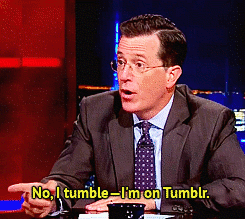
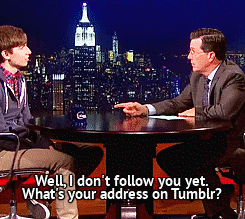
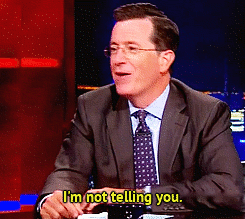

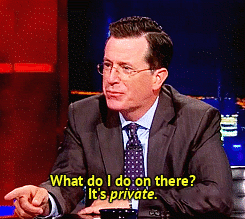
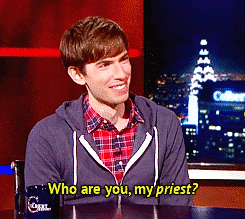
 This issue of privacy was more sharply addressed when, Karp fielded questions from Colbert regarding the National Security Agency (NSA) and the PRISM program. When specifically asked what he would do if Tumblr was approached to turn over data to the NSA, Karp responded, “That’s a complicated question, Stephen, you’re putting me on the spot. We don’t want to give you anything that’s not in the best interest of our users. We’ve fought for that for six years.” (The matter of whether or not this all goes out the window if Yahoo forces folks to login to Tumblr with a Yahoo account, etc., remains to be seen.)
This issue of privacy was more sharply addressed when, Karp fielded questions from Colbert regarding the National Security Agency (NSA) and the PRISM program. When specifically asked what he would do if Tumblr was approached to turn over data to the NSA, Karp responded, “That’s a complicated question, Stephen, you’re putting me on the spot. We don’t want to give you anything that’s not in the best interest of our users. We’ve fought for that for six years.” (The matter of whether or not this all goes out the window if Yahoo forces folks to login to Tumblr with a Yahoo account, etc., remains to be seen.)
In any case, privacy is one of the reasons why porn is so popular on Tumblr. Just how popular? To have an understanding of the actual amount of porn on Tumblr, we need some data:
According to an analysis of Tumblr’s 200,000 most-visited domains, 22,775 of them are adult – or 11.4 percent. The analysis was performed by web measurement firm SimilarGroup, a company which raised$2.5 million earlier this year with the intention of competing with Alexa’s stronghold in web rankings.
The measurement firm analyzed the volume of visits to these adult subdomains, and found that 16.6 percent of the traffic that visits Tumblr takes place on adult blogs.
In addition, 22.37 percent of incoming referral traffic from external sites to Tumblr is from adult websites, making that the leading category for referrals. Meanwhile, 8.02 percent of outbound traffic from Tumblr goes to adult websites.
Truth be told, porn and adult content is everywhere on the web, including other popular mainstream social or curation sites; no matter how you define it or try to scrub it (or force folks to opt in or out of it). And I feel this is what was largely reflected in Karp’s statements on The Colbert Report. Even if those realities are, as some say, likely to “disappoint one of Karp and Yahoo’s key audiences: advertisers.”
This issue of advertising is key to profitability, of course; so it’s not irrelevant. But, as Peter Kafka reports, Tumblr is only showing ads on the dashboards of logged-in users, anyway. “Non-story. Tumblr is the Internet. It’s a dashboard follower model, opt-in.”
In Karp’s defense, he quickly responded to Tumblr user upset and “clarified” a few things about the NSFW/adult content policies (greater details of which can also be found in Violet Blue’s recent article at ZDNet). But another issue stands out here…
In point three of his censorship response, Karp wrote:
Earlier this year, in an effort to discourage some not-so-nice people from using Tumblr as free hosting for spammy commercial porn sites, we started delisting this tiny subset of blogs from search engines like Google.
Like Ms Naughty, I wondered just what this meant. “Spammy” can be just as subjective as “pornography”; what are the guidelines? According to the Tumblr Community Guidelines, under “Spam” the following is listed:
Don’t use deceptive means to generate revenue or traffic, or create blogs with the primary purpose of affiliate marketing.
That sentence is more than a little clumsy, so let’s clean it up a bit. The message is “Don’t create blogs with the primary purpose of affiliate marketing.” Hmmm, this is starting to smell of the recent Google Blogger/Blogspot adult blog policy changes which target “blogs which are adult in nature and are displaying advertisements to adult websites.”
I can’t help but feel that the real problem here is people profiting off “dirty money” ~ money that these companies, Yahoo, Google, Tumblr, all leave on the table when they refuse to serve/offer any adult advertising. (The only ones brave enough, smart enough, to actually profit from adult advertising revenues appears to be JuicyAds and BlogAds.) When the search engine ad machines eschew such adult funds, why, then, are they saying we can’t pursue them via affiliate programs? I tell you, this growing pornocalypse has more to do with the finance sector than anyone, even Google & Yahoo, are willing to admit.
*sigh*
It almost makes one long for the good old fashioned mafia… At least that way you knew who was in charge, calling the shots, and there were rules with those shakedowns and payoffs. Now who the hell knows?
